- Home
- Products
- Elementary
- Boride Powder
- 3D Printing Powder
- Sulfide Powder
- Oxide Powder
- Carbide powder
- Nitride Powder
- Silicide Powder
- Hydride Powder
- Telluride Powder
- Selenide Powder
- Stearic Acid Series
- Phosphide Powder
- Nanoparticles
- Metal Alloy
- MAX Phase
- Lithium Battery Anode
- Surfactant
- Molecular sieves
- Concrete Admixtures
- News
- Answers
- Contact
- About
How long does it take to charge a lithium battery for the first time?
Recently, covid 19 outbreak spreads in Shanghai, China. There are more than 25,000 new asymptomatic domestic infections every day. China is implementing a dynamic zero-out policy. A leading respiratory expert said the key to COVID-19 prevention and control is to minimize transmission and fatality rate. Omicron has a low case fatality rate but is highly transmissible and can still claim many lives in large outbreaks. "Total openness is not applicable in China. For China, we should keep to the dynamic zero-out and gradually open up."
However, "dynamic zero clearance" is not the pursuit of complete "zero infection". As the Novel Coronavirus has its own uniqueness and strong concealment, there may be no way to prevent the detection of cases at present, but rapid detection and prompt treatment must be carried out, as soon as one case is found, one case will be dealt with.
The situation in Shanghai is serious. As the financial center of China, Shanghai is a very important city, and the outbreak of the epidemic in Shanghai will put a great impact on China's economy. The current task is to contain the spread of the epidemic as soon as possible, to achieve social zero so that Shanghai's life and economy quickly return to normal.
As China plays an important role in the global supply chain, the outbreak will have a significant impact on the supply and prices of many lithium battery.
Q: Now, whether it is a mobile phone or other equipment, lithium batteries are generally used. How long will the lithium battery be charged for the first time to activate the lithium battery?
A: The maintenance of lithium batteries has always been a controversial issue on the Internet. There are indeed some rechargeable batteries that require similar "activation" work. This is the earlier nickel-cadmium rechargeable battery and nickel-metal hydride rechargeable battery. These batteries will produce a phenomenon known as the "memory effect". Charging in an incomplete discharge state will easily overcharge the battery. Over time, crystals will grow on the electrode plates, blocking the contact between the electrolyte and the electrode plates. Causing the battery's voltage to drop, making the user feel that the battery will be used up soon. So for both types of batteries, periodically (rather than every time) fully discharging and recharging the battery can mitigate the voltage drop caused by the above reasons.
However, most of the batteries used in our mobile phones and laptops are Li-ion batteries. Lithium-ion batteries can store a lot of energy despite their small size, so they are more and more widely used. Lithium-ion batteries do not need to be activated by deep charging and discharging at the beginning of use because the initialization and testing process of the battery is already completed when the battery is manufactured. Lithium-ion batteries also have no so-called "memory effect" and can be recharged at any time. [2] The suggestion that a full charge and discharge of a lithium-ion battery be periodically recharged is only for the purpose of calibrating the charge detection devices on laptops and some high-end smartphones, not for any benefit to the battery itself. For devices such as ordinary mobile phones and digital cameras that display the approximate battery level in segments, there is no need to fully charge and discharge them regularly.

What? Some mobile phone manuals also say so? You should know that the battery of a mobile phone is generally not manufactured by the manufacturer of the mobile phone. This kind of writing on the manual may be to remind the user to test whether there is any problem with the battery. In addition, since nickel-cadmium and nickel-metal hydride batteries do need to be activated, this kind of writing on the manual may also be caused by copying the template.
Low-temperature lithium iron phosphate battery 3.2V 20A.
High-quality graphite supplier
Luoyang Moon & Star New Energy Technology Co., LTD, founded on October 17, 2008, is a high-tech enterprise committed to developing, producing, processing, selling, and technical services of lithium-ion battery anode materials. After more than 10 years of development, the company has gradually developed into a diversified product structure with natural graphite, artificial graphite, composite graphite, intermediate phase, and other negative materials (silicon-carbon materials, etc.). The products are widely used in high-end lithium-ion digital power and energy storage batteries. If you are looking for Lithium battery anode material, click on the needed products and send us an inquiry:sales@graphite-corp.com.
The downturn in tourism has caused the recession, and the weakening of the economy has also affected the market demand for lithium battery. Recently, however, the demand for lithium battery has increased, so contact us for the latest news on lithium battery.
Inquiry us